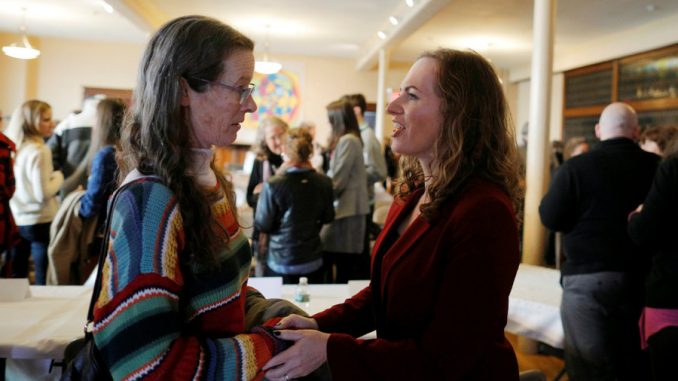
- An estimated 40 candidates who identify as transgender will be running for November election in all levels government.
- Many campaigns of transgender candidates will be backed by advocacy groups, including the Human Rights Campaign, the country’s largest LGBT civil rights organization.
- Their campaigns are characterized as an attempt to turn back the tide against the momentum Trump gained since winning the election and Republicans took control of Congress.
An unprecedented, record-breaking number of transgender candidates are slated to run for office in November election in the United States according to transgender news article released by the Reuters on February 8.
An estimated 40 candidates who identify as transgender will be up for election in all levels of the government.
Backlash against Trump
“The real simplistic answer to why I‘m running: It’s to answer a call. It’s to a answer a call to service like I did after 9/11,” said Alexandra Chandler, transgender woman and Democratic frontrunner seeking the nomination in the third district of Massachusetts.
Alexandra Cheng used to work as an intelligence analyst at the U.S. Navy. Coming out as a transgender woman in 2006, her conservative Republican military chain of command promoted her to division chief instead of firing her.
She cited the hate and divisive language of the current commander-in-chief, President Donald Trump, particularly in his 2016 presidential campaign leading up to his election, that prompted her to seek for office in the U.S. House of Representatives.
In his first year in assuming office, Trump has weakened several protections for members of the LGBT community in areas of education, employment, and housing. He announced his intention and then made an official policy for a transgender military ban, only to be blocked by the courts for being unconstitutional.
In addition, he had filled in people perceived to have anti-LGBT stance in his cabinet, as appointed officials, and as judges.
Chandler’s candidacy had caught attention and won endorsement from Tran United Fund. She had attended a four-day LGBT candidate course with the Victory Institute and did work for the National Center for Transgender Equality.
Her campaign focused on her 13 years of military service and would push for improvements in healthcare policies, address drug abuse crisis, and job creation.
“I’ve had Trump voters who say they’re going to vote for me. There is a hunger for something different,” she said.
Advocacy groups’ support
Many of the campaigns of transgender candidates were backed by advocacy groups such as the Human Rights Campaign (HRC), the country’s largest LGBT civil rights organization.
The group was reported to be dedicating $26 million to the elections, almost as much as it spent in 2012 and 2016 elections combined, in a move that would attempt to turn back the tide against the momentum Trump gained since winning the election and Republicans took control of Congress.
The number of transgender elected officials is lower than their gay and lesbian counterparts. However, last year, the eight victories of openly transgender candidates, including Danica Roem and Lisa Middleton, were the most recorded in the country.
Also announcing their intention to run for office are parents of transgender parents whose number is nearly equal to transgender candidates, claimed Mara Keisling, executive director of the National Center for Transgender Equality.
Voting Bloc
HRC identified 52 million pro-LGBT voters who could be mobilized to help in producing the votes needed to support and help win for candidates with LGBT advocacy. The number represented 37 percent of the 139 American voters who turned up in 2016 general election.
About 5 percent of the electorate identified themselves as LGBT as shown by exit polls.
The database will assist in targeting specific segments of the electorate to support or oppose initiatives or to help motivate people to participate in debates before a local school board.
Chad Griffin, president of the Human Right Group, said, “This is a voting bloc that has to be respected, and sought after, and feared.”
The conservatives, however, claimed that the LGBT advocates were overestimating their capability and were out of touch with reality that voters face. They also said that the campaign might backfire especially in locales with strong Trump support.
“I don’t think the transgender issue is going to be a winning issue for the Democrats or those on the left,” said Peter Sprigg of the Family Research Council, a conservative Christian and lobbying group.
The LGBT campaign will be employing microtargeting on a wide scale for the first time. Microtargeting, which is the use of voter demographics and commercial data, has been increasingly more sophisticated in each successive elections and is an indication of the importance in generating interest and enthusiasm among supporters.
Transgender groups vowed to double their efforts for this year’s elections. Keisling commented that while Republicans turned up in voting precincts more, “This year Democrats and progressives and immigrants and people of color and trans people are so angry and so scared, there’s never been more incentive to vote.”



Be the first to comment